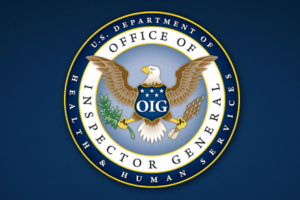
Oct. 1, 2021– The federal government has taken dramatic action to get drug companies to restore 340B pricing for outpatient prescription drugs dispensed by community pharmacies to patients of 340B hospitals. On Sept. 22, the Health Resources & Services Administration (HRSA) sent letters to six drugmakers informing them that the agency is asking the Office of Inspector General (OIG) for the Department of Health and Human Services (HHS) to consider imposing stiff financial penalties on the companies, an action 340B Health and others have been requesting publicly.
The letters – sent to Eli Lilly, AstraZeneca, Novartis, Novo Nordisk, Sanofi, and United Therapeutics – are a vital step toward resolving the more than year-long dispute involving 340B community pharmacies. Those companies have limited access to statutory 340B discounts to hospitals, health centers, and public health clinics that partner with community pharmacies to provide drugs to their patients. In May, HRSA sent those same companies letters informing them that their actions are unlawful, ordering them to submit plans by June 1 for restoring discounts and to refund overcharges. Rather than complying, all the companies have gone to federal courts seeking to block the government’s enforcement actions.
The 340B statute makes clear that in order for their outpatient prescription drugs to be covered and reimbursed under Medicaid and Medicare Part B, drug companies must offer discounts on those drugs when purchased by safety-net providers for dispensing to their patients. Companies that erroneously charge a higher amount than the 340B price are expected to repay those providers when the error is uncovered. But under a 2010 law and subsequent HHS regulations, the OIG has the power to impose additional civil monetary penalties (CMPs) on drug companies that “knowingly and intentionally” overcharge 340B covered entities for eligible drugs.
Those penalties can run as high as nearly $6,000 per violation. One of the companies says such fines “could amount to hundreds of millions of dollars in potential penalties every month” just for that one drugmaker. While HRSA’s threat of such fines did not change the drug companies’ behavior, the new possibility that OIG will impose them could put pressure on drug company executives to abandon their unilateral actions and restore 340B discounts through community pharmacy partnerships.
The OIG is an independent, objective oversight agency with dual reporting responsibility to the HHS secretary and to Congress. While most of its work involves combating fraud and abuse in the Medicare and Medicaid programs, the OIG also focuses attention on HRSA and other public health agencies.
What Comes Next
The threat of significant penalties might not be enough to change the actions of these six drug companies. After all, they are spending millions of dollars in legal fees to defend their pricing practices by attempting to block HRSA and OIG from acting against them. The companies have given every indication they will continue to dig in their heels until they are forced to retreat.
The OIG review could take months to complete. 340B Health President and CEO Maureen Testoni has called on the government to act expeditiously, noting that “the longer these drugmakers refuse to follow the law, to stop overcharging for 340B drugs, and to repay the denied savings, the greater the harm will be to patient care.”
The dispute goes beyond the six companies that received the recent letters from HRSA. Two more companies – Merck and Boehringer Ingelheim – started denying 340B discounts through community pharmacy arrangements after the May notices to the first six. 340B Health has called on its members to file notices of overcharges with HRSA against these two companies, noting that such reports are a key element in the government’s efforts to enforce the law.
Despite all the uncertainty about the process, the latest development on this issue is a positive sign of progress for the safety-net providers who have been pushing for the government to act since last year.